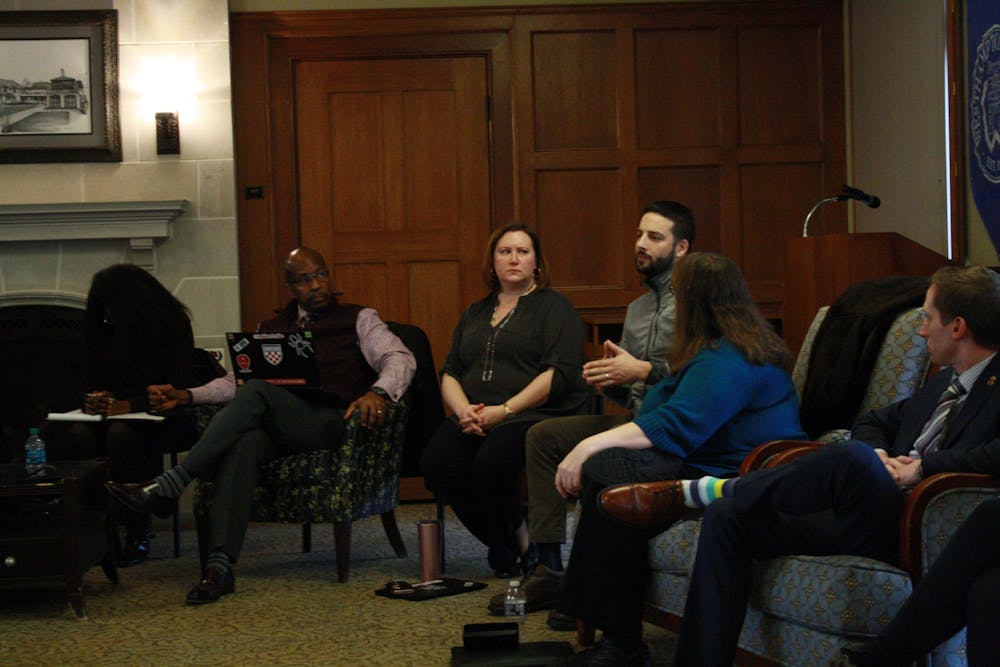Editor’s note: The article has been updated to more accurately reflect the comment made by Hilary Appleton.
In late January, University of Richmond staff members and students sat in a circle, filling the Westhampton Living Room. They expressed their concerns with the recent acts of racism on campus and asked what could be done.
Keith McIntosh, the chief information officer and vice president for Information Services, said he did not have a quick fix but asked where to start.
The conversation was a part of Intersections, a forum created and mediated by McIntosh. Every Wednesday from noon to 1 p.m., faculty members, staff members and students come together to discuss and learn about the difficulties of social injustices.
McIntosh created Intersections after the violent Charlottesville rally in 2017 that resulted in the death of Heather Heyer and injuries to dozens of others. People wanted to talk about it but did not know how to, or what to say, McIntosh said.
McIntosh and his staff at Information Services are responsible for managing the information and technology assets for UR academics and administration. McIntosh believed that he and the members of his team would work together more effectively if they could understand each other’s environmental challenges outside of work, he said.
Mclntosh grew up in a military family and served 24 years in the Air Force, traveling nationwide and abroad.
Through his travels in the Air Force, he became passionate about diversity and inclusion, McIntosh said. He said he had encountered people of many backgrounds and ethnicities and had learned how to embrace their differences without allowing them to be points of division.
McIntosh carried these lessons to his role at UR, where he created Intersections.
“My whole goal for Intersections is just to educate and make people more aware about their own stereotypes and biases and how they get them,” he said.
So far, the forum has covered subjects such as white fragility, white privilege, the #MeToo movement, structural racism and police brutality.
The forum on Jan. 29 was supposed to focus on the upcoming presidential election, but the topic changed to the recent acts of racism on campus. McIntosh allowed the attendees to voice their opinions and concerns.
Enjoy what you're reading?
Signup for our newsletter
Brittany Schaal, the head of the Office of Emergency Management at UR, spoke during the meeting about a conversation she had had with a student of color who said they were not surprised by the racist acts.
“I felt ignorant,” Schaal said.
“In what way?” McIntosh asked.
“How has this been happening and why now are we just realizing it?” she answered.
Charlynn Small, a staff psychologist for Counseling and Psychological Services, asked, “How can we live in a place that is just drenched in racism and not get wet?” Hums of agreement were heard around the room.
Ashleigh Brock, assistant to University President Ronald A. Crutcher, was also in attendance.
“We are no more racist or xenophobic than we were last week,” Brock said. “This was always here, it’s still here, it will still be here tomorrow.”
After her statement, Brock and other staff members discussed how they believed that the UR administration should be so adamant about its intolerance for racism that people with hateful ideologies would not want to attend the university.
Hilary Appleton, assistant director of donor relations for the Advancement Office, said she believed that the Human Resources department should institute mandatory anti-bias training for all employees.
Since the start of Intersections, sophomore Lauren Stenson, who was inspired by McIntosh’s series, has created a similar forum called Interpoint with another sophomore, Emma Johnson. Interpoint is a student-centered platform for the UR community to discuss race on campus and in the world.
Stenson told McIntosh about wanting to start her own forum and attended one of Intersection’s meetings before going off to create Interpoint, McIntosh said.
The first discussion of Interpoint’s three-part discussion series, which McIntosh attended, attracted more than 200 people on Jan. 28. He said he was proud of Stenson and the other students who put it together, and of the overall turnout.
Intersections meetings start with a brief history of the week’s discussion topic before the attendees are prompted to voice their reflections.
“I learn a lot in those rooms,” McIntosh said. “Tears might be shed sometimes. Sometimes we’re silent because we’re wrestling with a deep topic or sometimes we don’t agree, but we keep coming back and we keep having these conversations.
“I think those that persist and stick with that are richly rewarded.”
Contact contributor Jada Frazier at jada.frazier@richmond.edu.
Support independent student media
You can make a tax-deductible donation by clicking the button below, which takes you to our secure PayPal account. The page is set up to receive contributions in whatever amount you designate. We look forward to using the money we raise to further our mission of providing honest and accurate information to students, faculty, staff, alumni and others in the general public.
Donate Now



